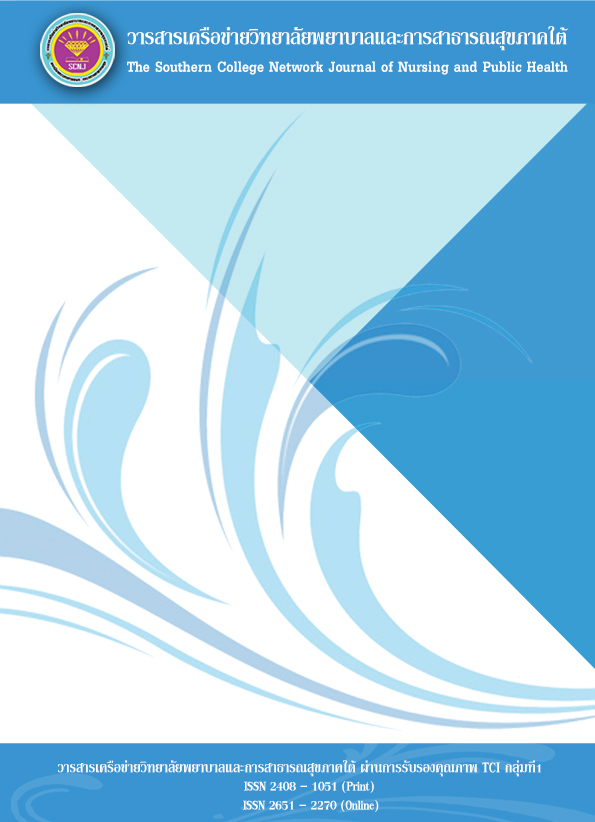ปัจจัยที่ส่งผลต่อคุณภาพชีวิตของคนไทย: มุมมองผ่านดัชนีการพัฒนามนุษย์
คำสำคัญ:
คุณภาพชีวิต, สังคมผู้สูงอายุ, งบประมาณการศึกษา, การปล่อยก๊าซคาร์บอนไดออกไซด์บทคัดย่อ
การวิจัยเชิงปริมาณนี้ มีวัตถุประสงค์เพื่อศึกษาปัจจัยที่ส่งผลต่อคุณภาพชีวิต และเพื่อศึกษาสมการทำนายดัชนีการพัฒนามนุษย์ คณะผู้วิจัยใช้ข้อมูลทุติยภูมิของประเทศในระยะ 20 ปี (พ.ศ.2533-2556) จากธนาคารโลกมาทำการวิเคราะห์ข้อมูลด้วยสถิติถดถอยหลายตัวแปร ด้วยวิธีกำลังสองน้อยที่สุด (OLS) ผลการวิจัย พบว่า
ปัจจัยที่มีความสัมพันธ์กับดัชนีการพัฒนามนุษย์ในทิศทางเดียวกัน อย่างมีนัยสำคัญทางสถิติ ได้แก่ รายได้ประชาชาติต่อหัวประชากร อัตราการเข้ารับการศึกษาในระดับมัธยมศึกษา อัตราการว่างงาน และอัตราการปล่อยก๊าซคาร์บอนไดออกไซด์เฉลี่ยต่อหัวประชากร สำหรับปัจจัยที่มีความสัมพันธ์กับดัชนีการพัฒนามนุษย์ในทิศทางตรงกันข้าม อย่างมีนัยสำคัญทางสถิติ ได้แก่ อายุขัยเฉลี่ยแรกเกิด อัตราส่วนงบประมาณทางด้านการศึกษาต่องบประมาณทั้งหมด และดัชนีคอร์รัปชั่น และมีข้อเสนอแนะในเชิงนโยบาย คือ ภาครัฐต้องส่งเสริมการทำงานของผู้สูงอายุวัยเกษียณ สำหรับการจัดสรรงบประมาณการศึกษา ต้องลดความเหลื่อมล้ำจากขนาดและที่ตั้งของสถานศึกษา และสนับสนุนการใช้พลังงานสะอาด และหรือเทคโนโลยีที่ทันสมัยเพื่อลดการปล่อยมลพิษด้วยมาตรการทางด้านภาษี
เอกสารอ้างอิง
Bank of Thailand. (2014). Thailand Economic Issues in 2014. Bangkok: Bank of Thailand. (in Thai)
Bank of Thailand. (2017). Yearly Report on Economic and Monetary Conditions. Retrieved January 17, 2018, from https://www.bot.or.th/Thai/MonetaryPolicy/EconomicConditions /AnnualReport/Pages/default.aspx
Bisonyabut, N. (2015). Inequality in Education: A conclusion from Thai PISA score. Retrieved February 17, 2018, https://www.pier.or.th/wp-content/uploads/2016/04/aBRIDGEd_2016 _008.pdf. (in Thai)
Center for Applied Economic Research. (2010). Thailand National Report Issue 2 Present to the United Nations Framework Convention on Climate Change (UNFCCC). Faculty of Economics, Kasetsart University. (in Thai)
Devalersakul, N., Siriwarakoon, W., & Roadyim, C. (2016). The Development of the Elderly as a Burden to Power: Case Study of Rangsit City Municipality. Veridian E-Journal, Silpakorn University, 9(1), 529-545.
Ekburanawat, W. (2016). Thailand's Toxicological Profile Database: Carbon Dioxide. Retrieved September 25, 2016, from: http://www.summacheeva.org/index_thaitox.htm. (in Thai)
Hamaide, B. (2015). Environmental Economics and Externalities. (Handout) Bangkok: Srinakharinwirot University.
Health and Safety Exclusive. (2016). General Hazards of Carbon Dioxide. Retrieved April 17, 2015, from: http://www.hse.gov.uk/carboncapture/carbondioxide.htm
Kerk, G., & Manuel, A. (2010). Short Survey of Relevant Indexes and Sets of Indicators Sustainable Development. Belgium ANPED Northern Alliance for Sustainabilit.
Mauro, P. (1995). Corruption and Growth. Retrieved April 9, 2015, from http://elsa.berkeley. edu/~saez/course131 /Mauro95.pdf
Mazurek, J. (2011). Environmental Kruznets Curve-A Tie Between Environmental Quality and Economic Prosperity. Czech Republic: E+M Ekonomie a Management.
Monataraphadung, S. (2012). The Situation of Corruption in Thailand. Valaya Alongkorn Review 2(1), 1-9. (in Thai)
Office of the National Economic and Social Development Board. (2016). The Twelfth National Economic and Social Development Plan (2017-2021). Prime Minister's Office of Thailand. (in Thai)
Rukumnuaykit, P., & Palakawong-na-Ayudhya, S. (2015) School Budget and Student’s Performance: Empirical Findings from Thailand. NIDA Economic Review, 9(2), 80-108. (in Thai)
Sukhothai Thammathirat Open University. (2016). Elderly Society: Implications for Economic Development. Retrieved September 30, 2016, from: http://www.stou.ac.th/stouonline /lom/ data/sec/Lom12/05-04-01.html. (in Thai)
Sukumalpong, J. (2013). Trend of Corruption in Thailand 2013. Bangkok: Laws Office, the Secretariat of the House of Representatives of Thailand. (in Thai)
Suwanrada, W. (2015). Expert Elder: Step into the Aging Society with Knowledge and Wisdom. Bangkok: Thailand Research Fund Press. (in Thai)
Thai Inequality Website. (2018). Thai Inequality. Retrieved February 17, 2018, http://www.thai-inequality.org/stories. (in Thai)
Thai Publica. (2013). Social Situation Q3, Poor Economy, Unemployment Rate Rises, High cost of living and Urban Poor is Hit Hardest. Retrieved September 30, 2016, from http:// thaipublica.org/2013/11/nesdb-social-q3-2556/. (in Thai)
Transpency International. (2015). Corruption Perceptions Index: CPI 2014. Retrieved April 17, 2015, from http://www.transpa rency.org
Treerat, N. (2012). Handout: Knowledge of Corruption in Thailand. Faculty of Economics, Chulalongkorn University. (in Thai)
United Nations Development Programme: UNDP. (2015). Human Development Report 2015. United Nations Development Programme. Bangkok.
World Bank. (2016). Life Expectancy at Birth, GDP per Capita, Enrolment Rate, Primary School and Secondary School, Unemployment, CO2 Emission Per Capita, Research and Development Expenditure, Adult Literacy Rate, Expenditure on Education. Retrieved April 17, 2015, from http://data.worldbank.org/indicator/SE.ADT.LITR.ZS
ดาวน์โหลด
เผยแพร่แล้ว
ฉบับ
ประเภทบทความ
สัญญาอนุญาต
1. บทความหรือข้อคิดเห็นใด ๆ ที่ปรากฏในวารสารเครือข่าย วิทยาลัยพยาบาลและการสาธารณสุขภาคใต้ ที่เป็นวรรณกรรมของผู้เขียน บรรณาธิการหรือเครือข่ายวิทยาลัยพยาบาลและวิทยาลัยการสาธารณสุขภาคใต้ ไม่จำเป็นต้องเห็นด้วย
2. บทความที่ได้รับการตีพิมพ์ถือเป็นลิขสิทธิ์ของ วารสารเครือข่ายวิทยาลัยพยาบาลและการสาธารณสุขภาคใต้








